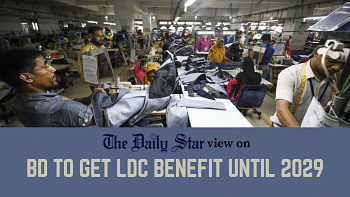Prudence needed in LDC graduation deferment decision

The question of whether Bangladesh should defer its graduation from the UN's Least Developed Country (LDC) category and the challenges likely to arise when it makes the transition have been a topic of debate for months. Considering the shocks impacting the country's economic growth and activities in recent years, business leaders—mostly from export-oriented industries—have asked to defer the graduation from 2026 to 2032 at a recent roundtable discussion organised by The Daily Star. Their concern is not without merit, yet there is much to consider before deciding on this matter.
As reasons for this deferment, speakers at the event cited a lack of preparedness to cope with the loss of trade preferences following the graduation. Among all the LDCs, Bangladesh—an entirely export-dependent economy—enjoys preferential access to the international markets the most. It is also the only LDC that uses the TRIPS waiver extensively in its pharmaceutical sector, and will suffer a huge blow in terms of drug production and prices when the waiver is lifted post-graduation. Bangladesh is also quite underprepared with coping mechanisms to deal with post-graduation repercussions. Although it will retain LDC trade benefits for three years after graduation, the country is nowhere near its biggest competitors, such as Vietnam and India, who have already secured free trade agreements with some of our biggest markets. For a country that has been waiting to become a developing country since 2018, there has been no real initiative to negotiate bilateral agreements with our biggest markets. Bangladesh also has alarmingly high logistical costs, poor governance, bureaucratic complexities, high cost of doing business, and weak infrastructure. Furthermore, compliance costs in labour standards, environmental protection, and intellectual property rights will also shoot up.
Despite these hurdles, some experts believe it's best to go along with the graduation schedule set by the UN. The white paper on the economy, published in December 2024, also states that there are "no plausible reasons" why it should be postponed. The incumbent planning adviser said a deferral might not be an option, despite there being several precedents. Indeed, Bangladesh cannot make the decision unilaterally; it needs to negotiate with the UN and the two other countries set to graduate with it in 2026—Nepal and Laos—to secure the deferment, needing to present strong evidence that a smooth transition would be significantly undermined.
In this situation, we urge the interim government to take a pause and consider all options. It must organise a national dialogue, bringing all stakeholders to the table, to consider all perspectives. The concerns raised by the business leaders must be reviewed carefully, and a pragmatic approach must be taken to deal with this situation, keeping in mind that very little time is left. Simultaneously, the issues cited above must be addressed with due haste to improve Bangladesh's competitiveness in global trade. Whatever decision is made, it must be in the country's and its people's greater interest.


 For all latest news, follow The Daily Star's Google News channel.
For all latest news, follow The Daily Star's Google News channel. 










Comments